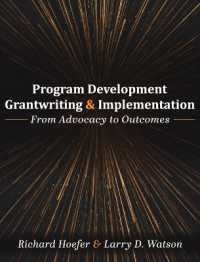Full Description
Currently, population health science is an integral part of global academic curricula. For over a century, the principles of the reductionist paradigm have guided population health curricula, training, research, and action. Researchers continue to draw upon these principles when theorizing, conceptualizing, designing studies, analyzing, and devising interventions to tackle complex population health problems. However, unresolved impasses in addressing pressing population health challenges have catalyzed calls for the integration of complex-systems-science-grounded approaches into population health science. Mounting evidence denotes that a complex systems paradigm can bring about dramatic, multipronged changes for education and training, and lead to innovative research, interventions, and policies. Despite the large and untapped promise of complex systems, the haphazard knowledge base from which academics, researchers, students, policymakers, and practitioners can draw has slowed their integration into the population health sciences.
This volume fulfils this growing need by providing the knowledge base necessary to introduce a holistic complex systems paradigm in population health science. As such, it is the first comprehensive book in population health science that meaningfully integrates complex systems theory, methodology, modeling, computational simulation, and real-world applications, while incorporating current population health theoretical, methodological and analytical perspectives. It is intended as a programmatic primer across a broad spectrum of population health stakeholders: from university professors and graduate students, to researchers, policymakers, and practitioners.
Contents
TABLE OF CONTENTS
PART I: POPULATION HEALTH SCIENCE IN A COMPLEX WORLD
Prologue
Yorghos Apostolopoulos
Chapter 1
Bridging the divide: Where complex systems science meets population health science
Yorghos Apostolopoulos
PART II: COMPLEX SYSTEMS AND THEORY IN POPULATION HEALTH SCIENCE
Introductory Material: Preview and Objectives
Chapter 2
Complex systems in a nutshell: Foundational concepts for population health
Megan S. Patterson, Michael K. Lemke, and Jordan Nelon
Chapter 3
Population health as a complex adaptive system of systems
Scott E. Page and Jon Zelner
Chapter 4
Complex network dynamics in population health
James Moody and Dana K. Pasquale
Chapter 5
Phase transitions and resilience in physical and psychological health
Marcel G.M. Olde Rikkert, Noemi Schuurman, and Rene J.F. Melis
Chapter 6
How complex systems science can revolutionize population health theory
Patricia Goodson
Take-Home Messages
Resources for Further Reading
PART III: COMPLEX SYSTEMS AND METHODOLOGY IN POPULATION HEALTH SCIENCE
Introductory Material: Preview and Objectives
Chapter 7
Designing population health research grounded in complex systems science
Leah Frerichs and Natalie Smith
Chapter 8
Model thinking and formal modeling to improve our mental models in population health research and action
Michael K. Lemke
Chapter 9
Engaging stakeholders in mapping and modeling complex system structure to inform population health research and action
Kristen Hassmiller Lich and Jill Kuhlberg
Chapter 10
Is it time to rethink "normal" in population health research?
Neal Dawson and Pierpaolo Andriani
Take-Home Messages
Resources for Further Reading
PART IV: COMPLEX SYSTEMS AND ANALYTICAL TECHNIQUES IN POPULATION HEALTH SCIENCE
Introductory Material: Preview and Objectives
Chapter 11
Mathematical modeling in population health research
Karen Hicklin and Kristen Hassmiller Lich
Chapter 12
Computational simulation modeling in population health research and policy
Nathaniel Osgood
Chapter 13
System dynamics modeling to rethink health system reform
Jack Homer, Bobby Milstein, and Gary B. Hirsch
Chapter 14
Agent-based modeling to delineate opioid and other drug use epidemics
Georgiy Bobashev, Lee D. Hoffer, and Francois R. Lamy
Chapter 15
Hybrid simulation modeling in population health
Sally C. Brailsford, Dave C. Evenden, and Joe Viana
Chapter 16
Validation of microsimulation models used for population health policy
Fernando Alarid-Escudero, Roman Gulati, and Carolyn M. Rutter
Chapter 17
Computational simulation modeling: A tale of five models for health policy analysis
Michael C. Wolfson
Chapter 18
Physical sciences for non-physical problems: Understanding and controlling human disease
Lazaros Gallos
Take-Home Messages
Resources for Further Reading
PART V: TOWARD A NEW POPULATION HEALTH SCIENCE
Introductory Material: Preview and Objectives
Chapter 19
Making the global complexity turn in population health
Brian Castellani
Chapter 20
Harnessing complex systems: An emerging paradigm for a new population health science
Yorghos Apostolopoulos
Take-Home Messages
Resources for Further Reading
GLOSSARY OF TERMS
INDEX








